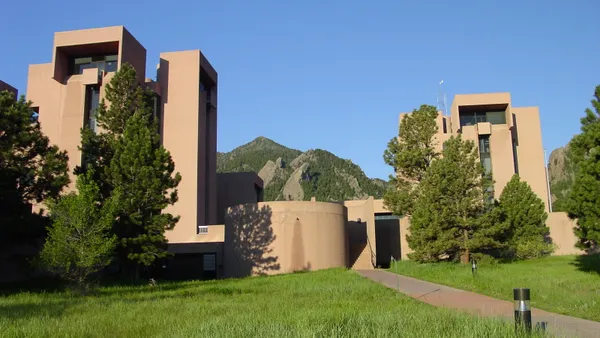Dive Brief:
- Los Angeles Mayor Eric Garcetti signed an executive directive this week to implement the city’s Green New Deal and kickstart what he’s calling a "Decade of Action" on climate change.
- The directive includes measures to back a congestion pricing pilot in Los Angeles. It also calls for more investment in transit and a citywide network of biking and walking corridors to get cars off the road.
- Under the directive, all new construction and upgrades of municipal buildings would have to demonstrate a pathway to carbon neutrality, and all new roofs or renovations will be required to be cool roofs. City pension boards will also be directed to explore divesting from fossil fuels and investing in green energy.
Dive Insight:
Garcetti first unveiled the city’s Green New Deal in April 2019, making Los Angeles one of the first cities to adopt its own version of the national climate change initiative. That plan set goals to reach 100% renewable energy by 2045, have 100% of vehicles in the city be zero-emissions by 2050 and make all new buildings emissions-free by 2030.
The new directive puts some teeth behind those goals by setting specific action plans, especially around transportation. That includes a 10-year timeline, building on warnings from scientists that governments must take action by 2030 to avoid the worst consequences of climate change.
"There is literally no time to waste — because what we do in the next ten years will determine the health of our planet and whether there’s a job, a paycheck, and a place for everyone in our economy," Garcetti said in a signing ceremony.
Given the city’s notorious dependence on cars, much of the plan is designed to reduce vehicle miles traveled among residents. As part of a goal to improve transit speeds by 30% by 2028, the city will invest in more bus-only lanes and explore signal priority. The congestion pricing research could lay the groundwork for a plan similar to New York City’s that would reduce driving in congested downtown corridors. It also comes as the city has sought to remake its transportation network with more electric vehicles ahead of the 2028 Olympics.
Bryn Lindblad, deputy director of the LA-based environmental group Climate Resolve, praised the plan for its focus on driving and addressing "all the pieces" of a transportation network. But she said there still could be more urgency, pointing to language that says the city would focus on one neighborhood per year to increase walking and biking infrastructure.
"That seems like a small number to me. Other cities can get a pretty functional city-wide network in less time," Lindblad told Smart Cities Dive. "I tend to be impatient, and I think the targets should be more ambitious, taken on at a faster pace."











